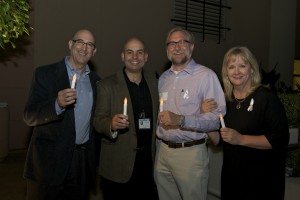The common saying is that “they come in threes.” We’re talking about celebrity deaths, of course, and although this is typically the sort of nonsense that can be justified simply by shifting the period of inclusion so it always appears to be accurate, there is something eerily unique about this past week. Within nine days, we have had three prominent people of the same age whose deaths are blamed on cancer.
First, we had Ellen Stovall, age 69 and president of the National Coalition for Cancer Survivorship. Technically, she died from complications related to cardiac disease, but the cause of her heart trouble is traced back to treatments she underwent 45 years ago for Hodgkin’s lymphoma. According to her obituary in the New York Times, she had a recurrence of the lymphoma in the 80s and then also discovered that she had breast cancer — about this time she also discovered a pamphlet from the organization she would later be president of, which introduced her to the term “survivor” as a replacement for the word that had been commonly used to describe cancer patients: victim. This subtle adjustment of language helped to give her drive and focus and to become a force in the next wave of cancer awareness. She died on January 5th.
Next came the news on January 10th that David Jones, better known as David Bowie, had died after an 18 month “battle” with an undisclosed cancer just two days after his 69th birthday. While his family declined to offer details, it was reported by the New York Times that the director of Lazarus, Bowie’s Broadway collaboration, mentioned liver cancer in an interview with Danish media. Whether this meant the cancer originated in the liver or had merely settled in that organ is not clear, keeping in tune with the varied enigmatic personas the performer was known for. However, not knowing the type of cancer adds not just to the mystique of David Bowie, but the general fear and uncertainty that the word “cancer” conjures on its own. Continue reading Death in Threes and the Power of Words




